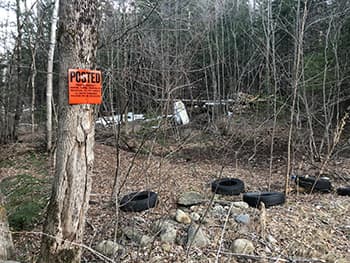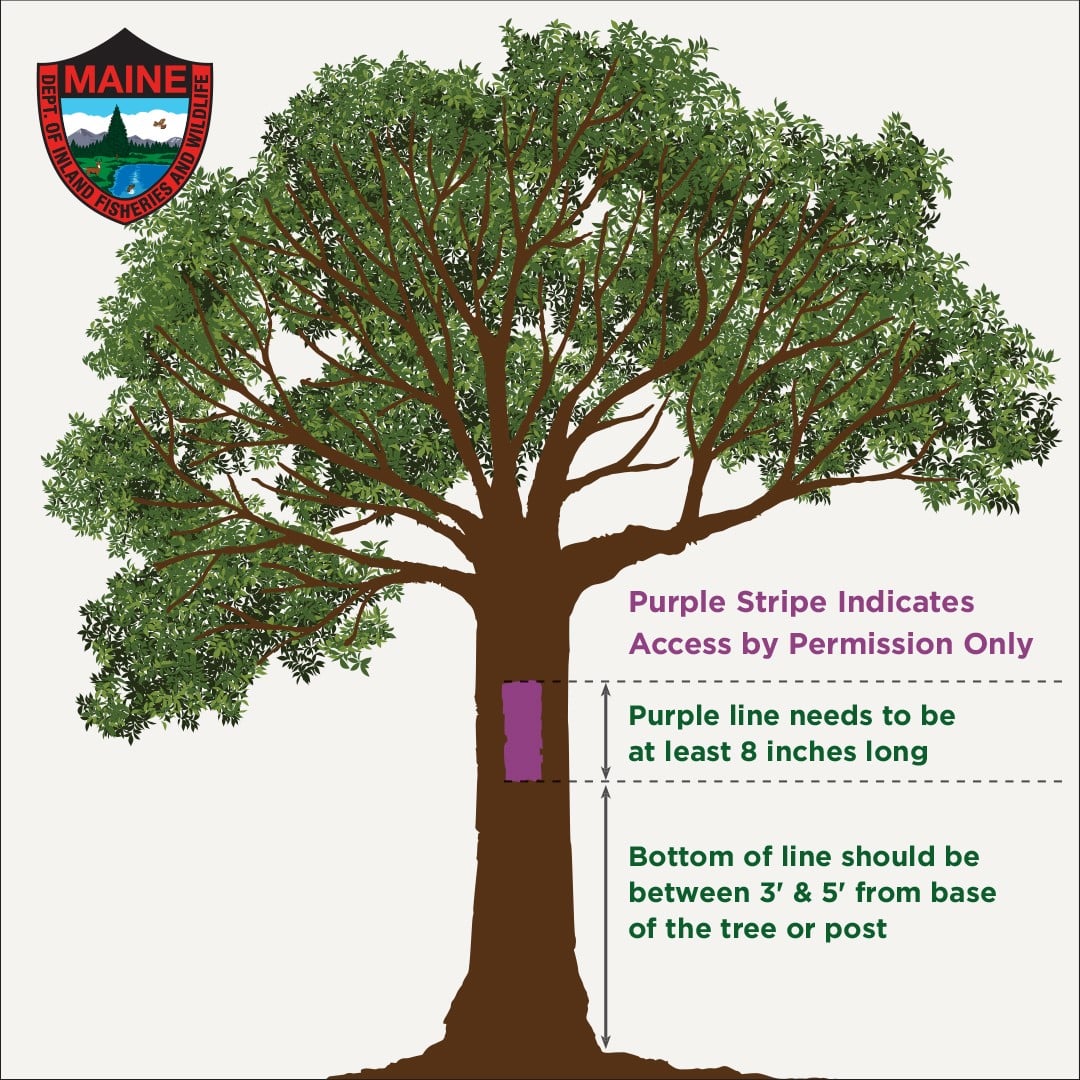Home → Programs & Resources → Outdoor Partners Program → Exploring the Outdoors on Private Land
Exploring the Outdoors on Private Land

Roughly 94% of Maine's forest land is privately owned, and more than half of that land area is open to the public. In total, landowners voluntarily open up more than 10 million acres of working farms and forests.
This access is an incredible gift, and in order to preserve it, everyone who ventures outdoors needs to understand the contribution that landowners make.
Most private landowners are happy to allow outdoor recreation, including hunting, fishing, walking, and hiking, on their land, as long as their property is treated with respect.
But it's important to remember that the private land you use for recreation belongs to someone else, just as surely as your car or home belongs to you, and accessing it is a privilege, not a right.
Accessing private land: there's the law, and then there's the unwritten rule.
The law - Unlike most other states, Maine operates under an implied permission structure, meaning that if land is not posted, it is legal to use the land.
The unwritten rule - Always ask permission. Hunting, fishing, hiking, biking, or otherwise using private land without the owner's permission is a careless move that puts everyone's future access at risk.
When venturing into the Maine woods, follow the unwritten rule.
7 Ways to be a good land user
Landowners who permit you to use their land for outdoor recreational activities are not only doing you a favor, they are placing their trust in you. Here are seven ways you can prove their trust is not misplaced:
- Always ask for permission, whether or not there are signs on the property requesting that you do so, and regardless of who owns it (a private individual or a business). If you don't know who the landowner is, use your resources and you will be surprised at how easy it is to find out:
- Contact the town office to determine the name of the landowner(s).
- Look up the person or business's contact information online and give them a call.
- Understand and respect the landowner's preferences. Learn what matters most to the landowner and follow any special requests, including where you may or may not drive or park, and what activities are permitted. Some landowners may require permission slips or permits for certain uses - if so, honor that. Always consider their perspective and prioritize their comfort and interests. Some landowners view certain recreational seasons as disruptive; it's your responsibility to ensure they never feel unwelcome or inconvenienced on their own land. Respect builds trust, and trust keeps land open.
- Provide clear, courteous communication. If asked, be prepared to share your name, address, phone number, and a description of your vehicle. Consider offering a pre-printed Landowner/Land User Courtesy Card (PDF) with your information. Taking the time to communicate clearly shows responsibility and respect.
- Offer to give back. A small gesture can go a long way in showing your appreciation. If you're hunting or otherwise recreating on someone's land, consider offering to purchase the landowner an antlerless deer permit when they're available in the fall. You can use the provided form (PDF) to collect the necessary information and complete the purchase on their behalf. In addition, offering to help with projects or routine work around their property, such as stacking firewood, repairing fences, clearing brush, or assisting with seasonal upkeep, can be an especially meaningful way to give back. Lending a hand not only demonstrates gratitude but also builds trust and reinforces your role as a respectful and responsible guest.
- Know your boundaries. Learn the exact property lines of the land you've been given access to - and stay within them. Trespassing is a criminal offense enforceable by all levels of law enforcement, and a conviction can result in the loss of your MDIFW-issued licenses. Respect the land, the law, and the permission you've been granted.
- Leave no trace. Treat the land as you would your own, or better. Always pack out what you pack in, and if you see litter left by others, pick it up. Being a good steward reflects well on all outdoor users.
- Follow the rules. Abide by all laws, practice safety and ethics, and report any abuse or misuse of the land. Irresponsible behavior leads to landowners closing their property to recreation, affecting everyone. If you witness a violation, contact Operation Game Thief at 1(800) ALERT-US [1(800) 253-7887].
8 Ways to lose the privilege

In addition to neighbor disputes, taxes, and fear of responsibility or liability if someone were to get hurt, landowners who post or close their property tend to do so for similar reasons. If you participate in any of the following, or witness any of the following and don't report it, you're putting everyone's future access at risk:
- Trespassing (on foot, by motor vehicle, or by recreational vehicle)
- Littering/illegal dumping
- Land abuse, including damage from vehicles or cutting of trees
- Off-trail riding
- Making excessive noise
- Illegal hunting, including driving deer, illegal stands, baiting, poaching, or shooting too close to a dwelling
- Not appreciating the landowner's generosity/ making them feel like they've been taken advantage of
- Letting the justice system fail (including failure to report violations as a bystander/witness)
Know the Laws
When using someone else's land, it's important that you know the laws — both so that you don't inadvertently break one, and so that you can recognize and report violations when you see them. This brief summary has been edited for readability, and is not all-inclusive. For the full text version, refer to Titles 12, 14 & 17A*.
Property Damage
Anyone who enters private property without permission and causes damage is liable to the owner in a civil or criminal action which could result in fines, penalties, and jail time. Examples of damage include:
- Tree damage - Damaging or destroying a tree on another person's land by inserting any metallic or ceramic object into it.
- Unauthorized tree stands - Erecting or using a portable or permanent tree ladder or stand on another person's land without permission from the landowner or the landowner's representative.
- Discharging your weapon too close to a building - Discharging a firearm or crossbow within 100 yards of a residential dwelling or building used to store livestock, machines, or harvested crops without the permission of the owner or their representative.
- Crop damage - Trampling or destroying any crop.
- Littering - Throwing, dropping, depositing, discarding, dumping or otherwise disposing of litter, in any manner or amount.
- Structural damage - Damaging or throwing down any fence, bar or gate, leaving a gate open, breaking glass, damaging any road, drainage ditch, culvert, bridge, sign, or paint marking, or doing other damage to any structure.
- Forest product damage or theft - Cutting down, destroying, damaging, or carrying away any forest product, including logs, pulpwood, veneer, bolt wood, wood chips, stud wood, poles, pilings biomass, fuel wood, Christmas trees, maple syrup, nursery products used for ornamental purposes, wreaths, evergreen boughs, or seed products, as well as any ornamental or fruit tree, agricultural product, stone, gravel, ore, or goods or property of any kind.
- Unauthorized harvest - Including harvesting Christmas tree and evergreen boughs, cutting firewood, and motorized gold prospecting without a landowner's permission.
Liability and Damages Recoverable
Whether or not the property damage was intentional, the offender still may be liable to the owner for 2X the owner's actual damages, plus additional costs that could include attorney's fees, court fees, and the value of the owner's time spent on the enforcement proceedings.
The owner's damages may be measured either by the replacement value or cost to repair the damaged property. Litter disposal damages include the direct cost of proper disposal, including obtaining permits, plus the cost of any site remediation undertaken because of the litter.
Posting of Land and Criminal Trespass (17-A MRSA, SS402)
Property is posted if it is marked with signs or paint in one of the following ways and in a manner that is reasonably likely to come to the attention of an intruder:

- Signs must indicate that access is prohibited, that access is prohibited without permission of the landowner or landowner's agent, or that access for a particular activity is prohibited.
- One vertical "OSHA Safety Purple" stripe at least one inch in width and at least 8 inches in length means "Access by Permission Only" when it is placed on trees, posts or stones between three and five feet off the ground. These signs or paint stripes must mark the property at distances no more than 100 feet apart at locations that are readily visible to any person approaching the property, and at all vehicular access entries from a public road.
In addition, landowners may also, either verbally or in writing, personally communicate to others that access is prohibited. Remember, it is unlawful to remove, mutilate, deface or destroy a sign or paint mark that is placed in order to prohibit or restrict access; and it is unlawful to post the land of another without permission of the landowner.